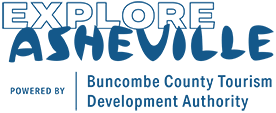The mission of the Buncombe County Tourism Development Authority is to be a leader in the economic development of Buncombe County by attracting and serving visitors, generating income, jobs, and tax revenues that make the community a better place to live and visit.
BACKGROUND
The Buncombe County Tourism Development Authority’s Tourism Product Development Fund (TPDF) was created to provide financial assistance through grants, loan guarantees, or pledges of debt service to major tourism capital projects that will increase patronage of lodging properties in, and further economic development in Buncombe County. Projects receiving TPDF investment have not only created jobs and entrepreneurial opportunities for local residents, but they have also provided amenities that are enjoyed by residents and visitors alike.
The TPDF is made possible solely through lodging taxes paid by overnight visitors staying in hotels, vacation rentals, and bed and breakfasts in Buncombe County. Use of these funds is in alignment with North Carolina State legislation and guidelines.
HISTORY OF TOURISM PRODUCT DEVELOPMENT FUND
The TPDF was created by the North Carolina General Assembly in August 2001 with the passing of House Bill 105, when the occupancy tax rate in Buncombe County was increased from 3% to 4%, with the additional 1% dedicated exclusively to TPDF.
In 2015, state legislation increased the occupancy tax rate from 4% to 6% and mandated that 75% of occupancy tax revenue be invested in marketing and promotion, and 25% be invested in the Tourism Product Development Fund. That same year, the BCTDA adopted significant changes to the TPDF program, including the addition of the Strategic Priority List and the Major Works funding pathway. These new strategic tools enable the BCTDA to take a more proactive approach to filling strategic gaps in the market and encourage collaboration between staff and applicants.
For several years, local hotel leaders as well as Buncombe County Commissioners and our local delegation advocated for a change in the allocation of the occupancy tax, increasing the percentage for investment in community capital projects and decreasing the percentage for travel promotion. A bill filed in June 2022, by Senators Chuck Edwards, Warren Daniel, and Julie Mayfield and passed as HB1057 (effective July 2022) changed the occupancy tax split from 75% to be invested in travel promotion and 25% for community capital projects, to a split of two-thirds/one-third, increasing the percentage for community capital projects. The legislation allocates the one-third capital project portion of occupancy tax revenue be divided into two equal funds: (1) Tourism Product Development Fund (TPDF), and (2) Legacy Investment from Tourism (LIFT) Fund. Please see enabling legislation below and associated Decision Tree for more information. The first grant cycle of the LIFT Fund is expected to begin in late 2023.
ENABLING LEGISLATION
Legislation enabling the Tourism Product Development Fund is the following:
- H1057 (Effective July 1, 2022): https://www.ncleg.gov/Sessions/2021/Bills/House/PDF/H1057v5.pdf
